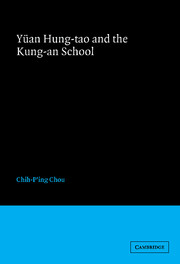Book contents
- Frontmatter
- Contents
- Preface
- 1 The literary scene before the rise of the Kung-an school
- 2 The literary theories of the three Yüan brothers
- 3 The poetry of Yüan Hung-tao
- 4 The prose of Yüan Hung-tao
- Epilogue: the legacy of the Kung-an school
- Notes
- The modern study of the three Yüan brothers and their Kung-an school: an introduction and select bibliography
- Chinese titles of works translated in chapters 3 and 4
- Glossary index
2 - The literary theories of the three Yüan brothers
Published online by Cambridge University Press: 30 October 2009
- Frontmatter
- Contents
- Preface
- 1 The literary scene before the rise of the Kung-an school
- 2 The literary theories of the three Yüan brothers
- 3 The poetry of Yüan Hung-tao
- 4 The prose of Yüan Hung-tao
- Epilogue: the legacy of the Kung-an school
- Notes
- The modern study of the three Yüan brothers and their Kung-an school: an introduction and select bibliography
- Chinese titles of works translated in chapters 3 and 4
- Glossary index
Summary
The Kung-an school of the late Ming derived its name from Kung-an hsien in Hupeh province, where the three Yüan brothers came from. The most active period of this school only lasted for about six years, from 1595 – when Yüan Hung-tao was appointed magistrate of Wu-hsien, Kiangsu province – until the death of Yüan Tsung-tao in 1600. Wu-hsien, at the heart of Soochow Prefecture, was the cultural center of the Yangtze valley. After serving as the magistrate of Wu-hsien for two years, during which time he resided in Soochow city, Yüan Hung-tao became disillusioned with bureaucratic life. Yet his tenure in office gave him a unique opportunity to share his ideas on literature with his friends in this area. Among them, Chiang Ying-k'o (1556–1605) and T'ao Wang-ling (1562–1609) were his two most enthusiastic supporters.
In 1598 Yüan Hung-tao joined his two brothers in Peking to accept a new appointment as an instructor in the Metropolitan Prefectural School (Ching-chao chiao-kuan). In the same year the Grape Society (P'u-t'ao she), a literary group led by the three Yüan brothers, was established at Ch'ung-kuo temple in the western suburbs of Peking. Its members included high officials and well-known scholars in the area around the capital. In addition to T'ao Wang-ling and Chiang Ying-k'o, Huang Hui (1554–1612), Hsieh Chao-che (1567–1624) and P'an Shih-tsao (chin-shih, 1583) comprised the central figures in this society. After the establishment of the Grape Society, the activities of the Kung-an school expanded until 1600, the year of Yüan Tsung-tao's death, and even though the active period of the Kung-an school was quite short, it nonetheless exerted a great influence on the development of late Ming literary criticism.
- Type
- Chapter
- Information
- Yüan Hung-tao and the Kung-an School , pp. 27 - 69Publisher: Cambridge University PressPrint publication year: 1988

